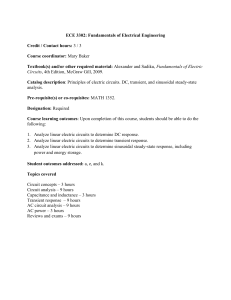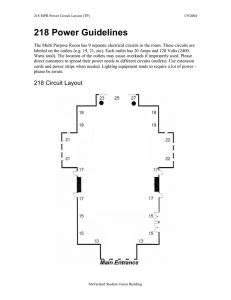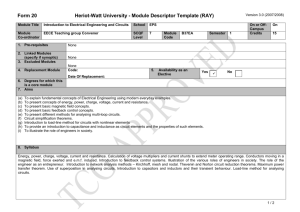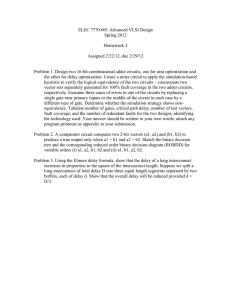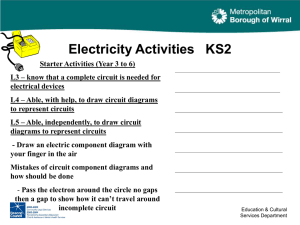Electrical Engineering Department EE 201: Electric Circuits I Second Semester, 2010/2011 (102)
advertisement
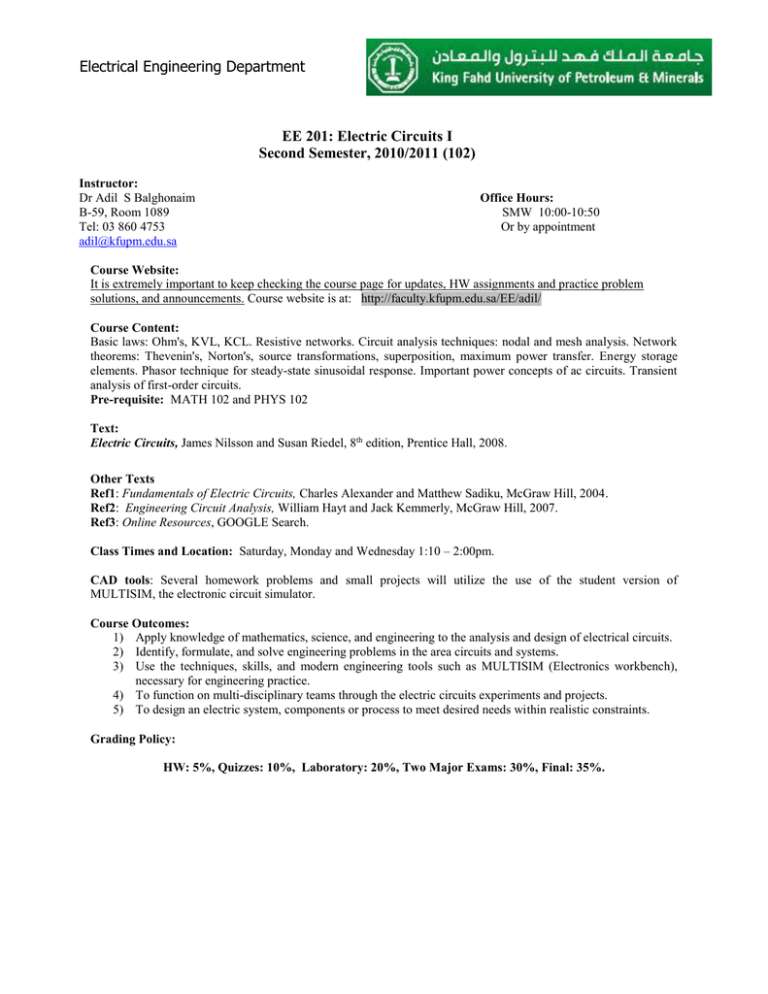
Electrical Engineering Department EE 201: Electric Circuits I Second Semester, 2010/2011 (102) Instructor: Dr Adil S Balghonaim B-59, Room 1089 Tel: 03 860 4753 adil@kfupm.edu.sa Office Hours: SMW 10:00-10:50 Or by appointment Course Website: It is extremely important to keep checking the course page for updates, HW assignments and practice problem solutions, and announcements. Course website is at: http://faculty.kfupm.edu.sa/EE/adil/ Course Content: Basic laws: Ohm's, KVL, KCL. Resistive networks. Circuit analysis techniques: nodal and mesh analysis. Network theorems: Thevenin's, Norton's, source transformations, superposition, maximum power transfer. Energy storage elements. Phasor technique for steady-state sinusoidal response. Important power concepts of ac circuits. Transient analysis of first-order circuits. Pre-requisite: MATH 102 and PHYS 102 Text: Electric Circuits, James Nilsson and Susan Riedel, 8th edition, Prentice Hall, 2008. Other Texts Ref1: Fundamentals of Electric Circuits, Charles Alexander and Matthew Sadiku, McGraw Hill, 2004. Ref2: Engineering Circuit Analysis, William Hayt and Jack Kemmerly, McGraw Hill, 2007. Ref3: Online Resources, GOOGLE Search. Class Times and Location: Saturday, Monday and Wednesday 1:10 – 2:00pm. CAD tools: Several homework problems and small projects will utilize the use of the student version of MULTISIM, the electronic circuit simulator. Course Outcomes: 1) Apply knowledge of mathematics, science, and engineering to the analysis and design of electrical circuits. 2) Identify, formulate, and solve engineering problems in the area circuits and systems. 3) Use the techniques, skills, and modern engineering tools such as MULTISIM (Electronics workbench), necessary for engineering practice. 4) To function on multi-disciplinary teams through the electric circuits experiments and projects. 5) To design an electric system, components or process to meet desired needs within realistic constraints. Grading Policy: HW: 5%, Quizzes: 10%, Laboratory: 20%, Two Major Exams: 30%, Final: 35%. Tentative Schedule Week Topic 1 12 Feb. 2 19 Feb. 3 Reading assignment Circuits Variables, Sources, Power and Energy Ohm’s Law, KCL, KVL, Dependent Sources 1.1-1.6, 2.1 26 Feb. Resistive Circuits, Nodal Analysis 3.1-3.4,3.7, 4.1 4 5 Mar. Nodal Analysis (Continued), Mesh Analysis 4.2-4.5 5 12 Mar. Mesh Analysis, Source Transformation 4.6-4.9 6 19 Mar. 7 26 Mar. 8 2 Apr. 2.2-2.5 First Major Exam Wednesday 16th March, 2011 Thevenin and Norton Equivalent 4.10-4.11 Circuits Maximum Power Transfer, 4.12-4.13,5.1-5.2 Superposition Operational Amplifiers 9 - 13 Apr. 5.3-5.6 Homework / Projects † No Experiment Exp # 1 : Electrical circuits simulation using Multisim Electronics Workbench Exp #2 : Electric circuit fundamentals Exp # 3 : Resistors in series, color codes & power rating Exp # 4 : Kirchhoff’s laws No Exp. Exp # 5 : Series & parallel circuits, voltage divider & current divider rules Exp # 6 : Superposition theorem SPRING BREAK 9 16 Apr. Inductors, Capacitors, First Order Circuits 6.1-6.3,7.1-7.2 10 23 Apr. First Order Circuits (Continued) 7.3-7.7 11 30 Apr. Second Major Exam Saturday 30th April, 2011 First Order Circuits, Sinusoidal 9.1-9.2, App. B. Response, Complex Numbers . 12 7 May Frequency Domain Analysis 9.3-9.7 13 14 May Frequency Domain Analysis (continued) 9.8, 9.9, 9.12 14 21 May 10.1-10.5 15 28 May Average and Reactive Power, Complex Power Maximum Power Transfer Exp # 7 : Thevenin’s theorem and maximum power transfer Exp # 8 : DC sweep analysis Exp # 9 : Transients of a first order RC circuit Exp # 10 : The oscilloscope and function generator Exp # 11 : Sinusoidal AC analysis Final Lab Exam 10.6 † Homeworks and Project are due on dates shown on the class website. No Late submissions will be accepted. Important Points to Remember: 1. Practice Problems: Practice problems are to be solved completely by the students. Solutions will not be collected but it will be posted on the class website. Different assignments will be given as homework. 2. Pre-Labs: Each student must submit the pre-lab. Assignment at the beginning of each lab. (No pre-labs for the first two experiments). No pre-lab will be accepted for an experiment that has already started. 3. Lab. Makeup: No lab makeup will be allowed without an official excuse from students affairs. 4. Attendance: According to the university regulations, any student that exceeds 20% (9 lectures) of the scheduled class meeting without an official excuse will receive a grade of DN in the course. 5. Official Excuses: All official excuses must be submitted to the instructor no later than one week of the date of the official excuse. The instructor may not accept late excuses. 6. Course Lectures: This class will use the instructor class notes and you are supposed to READ YOUR BOOK. Some online lectures are available online through the Open Courseware. You are strongly encouraged to systematically review those online lectures to enhance your understanding of the course material. Suggested Practice problems: PP #01: 1.12, 1.13, 1.19, 1.26, 2.4 PP #08: 5.2, 5.10, 5.13, 6.2, 6.4, 6.13 PP #02: 2.6, 2.12, 2.20, 2.25, 2.26 PP #09: 7.4, 7.10, 7.11, 7.21, 7.35 PP #03: 2.28, 2.29, 3.4, 3.7(c), 3.8 PP #10: 7.46, 7.47, 7.63, 7.84, 9.1, 9.6, 9.8 PP #04: 3.13, 4.3, 4.15, 4.19, 4.25, 4.27, 4.29 PP #05: 4.51, 4.52, 4.55, 4.56, 4.59 PP #06: 4.60, 4.63, 4.67, 4.68, 4.70 PP #07: 4.73, 4.75, 4.86, 4.88
